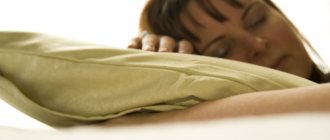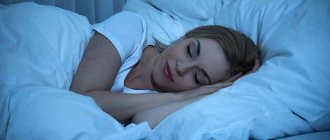Greetings, dear reader!
For active and full-fledged human activity, adequate sleep is of great importance. Getting a good night's sleep means looking great, feeling energized, active, and productive throughout the day. But in the modern rhythm of life, it is not always possible to get enough sleep, and sometimes lack of sleep becomes a permanent habit. But the good news is that this problem can be solved. In this article, we will analyze all the most effective recommendations that will help you start getting enough sleep once and for all, study the causes of poor sleep and work on eliminating them. Well, are you ready? Then let's begin!
How much sleep is better to get enough sleep?
To answer this question, determine your optimal sleep time . To do this, choose a day when you don’t need to get up early in the morning and sleep until you feel like getting up. After getting up, remember or write down your wake-up time and bedtime time. Then count the difference between the time you fall asleep and the time you wake up. This difference will be your ideal sleep duration. For example, if you fell asleep at 2:00 and woke up at 10:00 (and fully rested), you need to sleep at least 8 hours a day. On average, the optimal sleep time is 7-9 hours .
How to sleep little and be cheerful: method No. 3
There is another way to sleep little and get enough sleep without experimenting on yourself. However, it is more suitable for night owls and people who work from at least 10 am. Following this method, you need to go to bed between 4 and 5 am . However, you should get up no earlier than 9:00.
Between 5 and 9 am, the human body is tuned to the deepest sleep possible. Therefore, if you want to sleep less, but wake up refreshed, catch this particular time for sleep.
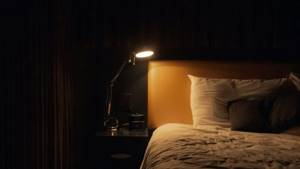
What time is best to go to bed to get enough sleep?
It is easy to assume that the time of falling asleep, as well as the duration of sleep, is calculated individually. To do this, for five to six evenings, monitor what time you feel most sleepy. For example, if during the week you want to go to sleep at 20:00, but you go to bed at 22:00, move your bedtime back a couple of hours.

How to train yourself to sleep less: method No. 4
Polyphasic sleep techniques will help reduce sleep without reducing alertness . With this kind of rest, sleep is divided into stages that need to be followed in order to get enough sleep. Polyphasic sleep was popular with many famous people because it saved a lot of time. For example, the polyphasic sleep technique was used by Leonardo da Vinci, Nikola Tesla, Napoleon Bonaparte, Salvador Dali .
There are 4 main types of polyphasic sleep:
- Biphasic – 6-7 hours of rest at night and 30 minutes during the day;
- Everyman – 2-3 hours of sleep at night and 3 times for 20 minutes during the day;
- Dymaxion – sleep for half an hour every 5 hours;
- Uberman - sleep 6 times a day at regular intervals (on average every 3.5 hours).
Choose a polyphasic sleep mode that is convenient for you and get enough sleep in a short time.

How to get good sleep in a short time
Getting enough sleep in a short time, for example, 2-3 hours, while feeling great, most likely, will not be possible. However, the famous scientist Nikola Tesla, according to him, succeeded. However, for the average person, 2-3 hours of sleep will not be enough to get a good night's sleep. The recommended minimum for more or less normal well-being is 5 hours of sleep per day . However, if you sleep in this mode constantly, over time you will accumulate fatigue, which will certainly affect your performance. Therefore, it is recommended to switch to short sleep for a maximum of 5-7 days.
If you still decide that you need to sleep in a short time, you need to sleep a certain number of hours. Our entire sleep consists of cycles that last on average 1.5 hours. Moreover, the number of such cycles in an 8-hour sleep is usually 4-5.

During each cycle, sleep has a certain depth. As a rule, shallow sleep is observed at the beginning and end of the cycle. At the same time, in the middle of the cycle, sleep is as deep as possible. Thus, if you wake up during a period of shallow sleep, you can get enough sleep even in 3-4 hours .
Okay, but how to calculate the phase of shallow or REM sleep? First option: you need to sleep for such a number of hours that it is a multiple of 1.5 hours . In other words, you need to sleep 1.5, 3, 4.5, 6, 7.5 or 9 hours. In our case, in order to get a good night's sleep in a short time, it is advisable to sleep for at least 4.5 hours.
Another option for determining REM sleep involves sleeping with a special bracelet that tracks your body movements in bed. The bracelet's sensor records all body turns and, based on this data, builds a sleep schedule, which can then be viewed on your smartphone. Additionally, many sleep trackers can be set to wake you up during REM sleep. With the help of such devices, you can get a good night's sleep in a fairly short period of time without unnecessary hassle.

Negative consequences of lack of sleep
If a person constantly does not get enough sleep, then certain health problems may soon begin. The most common consequences of lack of sleep include:
- 1. Decreased immunity. The human immune system is directly related to sleep. Poor quality and short sleep reduces a person’s immunity, which will inevitably lead to colds, especially in winter.
- 2. Excess weight. With a lack of sleep, the body does not recover, and it requires additional energy in the form of food. Over time, this will lead to the appearance of extra pounds.
- 3. Bags under the eyes. This is one of the most common symptoms of sleep deprivation, and almost anyone who has trouble sleeping will experience the gradual appearance of dark circles under their eyes, which will only become more pronounced over time.
I think these are good enough reasons to try to train yourself to get a good night's sleep. Let's move on to the main part. As usual, I will ask you to arm yourself with a pencil and make a short summary of the recommendations that seem most suitable to you. Don’t put it off until tomorrow, use a few recommendations today - get rid of bad habits, establish a routine, and soon you will notice how you will begin to get enough sleep. Our course will consist of 3 consecutive parts. Well, shall we begin?
What to do to get better sleep?
To answer the question of how to get a good night's sleep, try to adhere to the following tips.
- Do not engage in extraneous activities in bed . Due to working with a laptop or smartphone in the bedroom, the bed ceases to be associated with sleep. Therefore, it is better not to disrupt the “bed-sleep” connection and go to bed only if you want to sleep. In addition to sleeping, the bed can be used for sex. But nothing more.
- Don't go to bed hungry or with a full stomach . Severe hunger is unlikely to let you sleep. In this case, it would be a good idea to have something light to eat. For example, eat some cottage cheese or drink milk. The main thing is that the snack must be light. A full stomach also does not help you fall asleep. Heaviness in the stomach from the abundance of food impairs sleep and often leads to weakness in the morning. Therefore, no feasts at night.
- Minimize work with smartphones and computers 30 minutes before bedtime . The light from an electronic device inhibits the production of melatonin, a sleep hormone that is produced in the brain when darkness sets in. At the same time, even a 5-minute check of messages on social media. Networking before bed can completely ruin your entire sleep.
- Meditate . This activity is not as difficult as it seems. To do this, sit or lie down in a comfortable position, close your eyes and tune in to deep breathing. Complete relaxation can be achieved by turning on meditative music. You can breathe using the 4-7-8 method described in this article.
- Read a book . If you have problems falling asleep, read paper books or magazines. Reading e-books or text from tablets, as already mentioned, disrupts the production of melatonin. Therefore, if possible, study paper literature. The process of reading will distract you from extraneous thoughts, which is good for falling asleep.
- Follow a bedtime ritual . Each of us probably has a ritual that signals sleep. For example, if you regularly shower before bed, this will tell your brain that it is time to sleep. In your case, this may be another action, say, washing or airing the room.

Features of the use of short sleep
If there is enough time for rest, a person does not have chronic diseases, following the rules, you can get a great night's sleep. But what to do when there are sorely not enough hours to sleep? Go into short sleep mode. What are the features:
- rest time is short, but periods are frequent;
- the body gets proper sleep;
- working time is used as efficiently as possible;
- brain activity and memory improves.
If you learn to sleep briefly but deeply, you can cope with any amount of work without overworking your body.
Reasons for switching to short sleep mode
A person may need a short nap technique in a variety of situations. And the inability to get enough sleep overnight plays an important role. In what cases should you try short-term recovery methods:
- at the birth of a child, when it is not possible to sleep normally at night;
- in cases of performing a large volume of work;
- during the session for students;
- with a busy schedule of activities;
- in case of an emergency (for service workers).
A technique that helps you quickly get enough sleep in a short time during the day or at night is practiced when caring for a seriously ill relative. It is especially important to have strength with an established diet and a course of medications. The technology also helps athletes before preparing for competitions - they can accomplish a lot in a limited period of time.
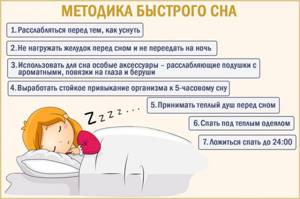
The advantages of such a holiday
When starting to practice the short sleep technique, you should understand that you will have to learn to fall asleep at a strictly defined time and adhere to the regime for at least 5 days. The duration of the general course depends on the patient’s well-being. But, having gotten used to getting enough sleep quickly and efficiently, it’s difficult to give up the advantages of such rest:
- The day literally “stretches” to infinity, and a lot of free time appears.
- Academic performance and productivity increase several times.
- Priorities are set: when doing unimportant, unnecessary things, one becomes sleepy, so a person devotes his time to what is really necessary.
- Time will be counted not in days, but in hours, into which more and more things can be done.
Attention! A short nap has many benefits, but the use of technology is prohibited for people with mental disorders and certain diseases.
How to get a good night's sleep and fall asleep quickly with physical activity
Exercising a few hours before bedtime will help you fall asleep faster. In addition, active muscle work and pleasant fatigue in the evening make sleep deeper. running or the gym as physical activity . Both activities involve the maximum number of muscles. This means that pleasant fatigue and sleep will come faster after running or visiting the gym.
If you don’t have any energy left to run or go to the gym in the evening, you can just take a walk . Walking calms the nerves, so for a good night's sleep it is useful to walk outside for 30-60 minutes. You can spend more time on walks, especially if you have the energy and time.
For those who do not want to leave the house, but want to get a good night's sleep, we can recommend simple exercises that will help them fall asleep. The same squats, push-ups and abdominal crunches will help a person get tired and restore sound sleep.
An important point: all sports activities should be completed 2, or preferably 3 hours before bedtime. After intense training, the body is in a state of excitement for some time. Therefore, going to bed immediately after completing all the exercises is not recommended, as it will be more difficult to fall asleep. Although some people sleep like the dead after training and don’t wonder how to get a good night’s sleep.
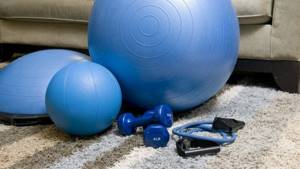
Part 1: Preparation
In this block we will work on how to properly establish a routine and begin to get used to a new lifestyle in which you will get a good night's sleep. Go!
Find the reason for lack of sleep
The first and most important thing is to find the main reason why you are not getting enough sleep. This could be the habit of watching TV series late into the night, drinking coffee or tea in the evening, or “hanging out” on social networks until late at night. Write down this reason. And do something every day to eliminate the cause of your lack of sleep once and for all.
Decide on the amount of sleep you need
The work schedule does not take into account the individual characteristics of a person by chronotype. Whether you are a night owl or a morning person, you have to get up in the morning and go to work. Create a routine so that your body gets the amount of sleep it needs to recover. This advice is very important for proper sleep, and you need to not only identify your sleep norm, but start observing it every day - including on weekends. Of course, at first it will not be easy, but very soon you will feel how your body gets used to the schedule and you begin to fall asleep very quickly.
Create a sleep schedule
Create a schedule on paper that will help you use your time wisely. Calculate the required time for waking up, as well as for morning activities. Based on eight hours of sleep, calculate when you need to start going to bed. If you need an hour to do your morning chores and need to leave home for work at eight in the morning, then to get eight hours of sleep you need to go to bed at twenty-three.
Plan your day
You need to plan not only your sleeping hours, but also your daily routine. This is necessary so that you learn how to get everything done , and you don’t have to stay up late doing something and violate your established sleep schedule. Think in advance about everything you need to do during the day and try to act in accordance with the schedule.
Remember to exercise

Physical exercise helps keep the body in excellent condition. If you don’t want or can’t go to the gym, start jogging in the evening and do a set of physical exercises. Do exercises in the morning. Spend at least 30 minutes a day doing exercise. If you don’t have that much time, you can train 3 times a day for 10 minutes. Starting to exercise is very important to maintain healthy and restful sleep.
What is the best sleeping position to get a good night's sleep?
The best position for a good sleep is considered to be on the left or right side . Unlike the position on the back or stomach, this position is the most physiological for night rest. Sleeping on your stomach puts pressure on your internal organs, which can interfere with the proper functioning of your heart and lungs. At the same time, sleeping on the back is often accompanied by snoring, especially in overweight people. Therefore, for good sleep, somnologists often recommend sleeping on your side.
However, if you feel comfortable sleeping on your back or stomach, and you don’t feel groggy in the morning, you don’t have to change your habits.

How to make your sleep more effective?
1. Sleep on your side
The ideal sleep is on your side. The supine position is harmful and promotes snoring. And in the position on the side, the brain is better cleansed of toxins - this way the lymph drains better, carrying toxic substances from the brain. This is a new discovery: the lymphatic system of the brain itself was discovered only 3 years ago; before, its existence was not suspected. It works better during sleep, but now it turns out that its activity also depends on the position of the body in bed. Since it is difficult to control the position during sleep, not everyone manages to spend almost all the time while sleeping on their side. Try this trick: sew a pocket with a clasp on your nightgown or pajamas between your shoulder blades and put a tennis ball in it.

Lie down in a pose. How to sleep to stay healthy
More details
2. Eat more at work
It is almost impossible for many to exclude a late dinner from their diet - the working day ends at 19.00, people arrive home so late that all that remains is to prepare food, eat it and go to bed. In such cases, it is better to eat at work or on the way from work. And at night drink a glass of kefir (without cookies!)
3. Say goodbye to lamps
Avoid even short exposure to light at night. When you sleep, be sure to turn off all lamps in the bedroom (even nightlights!), TV, computer, etc.
Article on the topic
"Owls" under duress? How to improve your sleep
4. Have a night out
Try to lengthen the night to 9-10 hours. Use shading lampshades in the bedroom, and cover the windows with blackout curtains to block out light from the street.
5. Eliminate strength training in the morning.
The best way to exercise to help you wake up is to do stretching exercises. You should do cardio fitness and strength exercises in the afternoon - ideally at 15-16 hours.
6. Turn off the computer and TV an hour before bedtime
Working with electronic devices inhibits melatonin production.
7. Get up with the sun, even if you went to bed late the night before
After just 1-2 days of this regime, going to bed early will no longer be a problem.
8. Get a foot massage or buy massage insoles
There are many active points on the sole; it is useful to stimulate them for tone.
Article on the topic
Night sleep companion. How to get rid of snoring?
9. Live at the rhythm of nature
Unfortunately, in modern conditions, the biorhythms of our body do not coincide with the natural rhythms that dictate the sunrise and sunset for us. About an hour before dawn, the human body undergoes major biochemical changes that should provide energy to start the day. This also results in the release of hormones, a number of which increase blood pressure and cause the heart to contract faster (because of this, heart attacks and strokes occur more often in the morning). But unlike our ancestors, we do not wake up, but spend these hours sleeping. If we got up and went outside, as people have done from time immemorial, then the negative effect of the shifts would be weakened. The energy of glucose and hormones would be directed in a peaceful direction: sugar would be absorbed by the muscles, and not converted into fat, as happens during sleep, and hormones would help the body get back to work. In addition, the solar spectrum at sunrise gives optimism.
10. Don't eat breakfast right after waking up
Let your body come to its senses. It is ideal to have breakfast after a short walk (for example, with a dog in the park or with a child before kindergarten) or exercise.
11. Choose red
If you get up at night, light your toilet and bathroom with dim red light, which is less melatonin-suppressing than white or blue light.

Hidden deficit. How can you tell if you're not getting enough sleep?
More like
The best way to get a good night's sleep
Is there an easy way to get a good night's sleep? There is no single answer to this question. For one person, to have a good sleep, it is enough to meditate before going to bed, while another needs physical exercise, and for a third, it is difficult to close his eyes without a sleeping pill. To understand which method is right for you, you need to try them all.
It is worth warning you against taking sleeping pills that are taken without the consent of a specialist. Such drugs can cause psychological dependence and have a lot of side effects . Therefore, it is better not to get hooked on them. They can be taken only after consultation with a doctor.

Drinks good for sleep

Herbal teas have a positive effect in relieving insomnia, reducing nervousness and improving sleep. The best drinks to help you get a good night's sleep are:
- valerian;
- lavender;
- Melissa;
- hawthorn;
- mint;
One of these drinks can be consumed instead of the usual evening black tea, and this will promote calm and further comfortable sleep.
When to teach your baby to sleep on his own
You can teach your baby from an early age, following the rule, the sooner the better. But if the child is on breastfeeding, and at the same time also sleeps with his parents, then it is worth putting the baby to bed separately after weaning. But keep in mind that the older the child gets, the morally harder it is for him to fall asleep separately, and therefore for the parents too.

At a younger age, they quickly get used to their crib.
The following are the main signs when the baby is ready to sleep independently and separately:
as we have already mentioned, this should be done when the baby has already been weaned and has safely forgotten about it. That is, it took about 2-4 weeks. After all, each child experiences this purely individually; he already sleeps all night or at least about 6 hours. But practice shows that the lack of need for breastfeeding delays frequent waking up. If a child sleeps with a pacifier, then this will not guarantee that he will not wake up at night. After all, it acts on the principle of the breast. Therefore, it is necessary to fight it, but not necessarily right away
You shouldn’t give your baby two stresses at once; a little hint - the child does not require the constant presence of his mother and can walk in the room on his own for at least 20 minutes, then he is ready to sleep separately; and if he notices his mother’s absence, no matter whether it’s day or not, then he doesn’t throw tantrums and a hail of tears; and he has already developed the concept of “mine.”
But it’s worth taking a little time if you notice:
- the baby often wakes up at night, especially against the background of overexcitation of the nervous system;
- or he generally painfully endures parting with his mother;
- premature babies may be more attached to their mother;
- the same applies to children who have received congenital, or during childbirth, trauma of any nature;
- when the baby is sick, of course, wait a little;
- If you recently went to kindergarten, do not rush to shift your baby. Perhaps the adaptation period has not yet passed. The baby will recover from the first stress.

If you are expecting a second baby, then get used to your crib before the arrival of a brother or sister
How to learn to sleep little: method No. 6
Physical activity can make you sleep less but deeper . Light workouts or walks in the evening will help you sleep less and get enough sleep. Note that the loads should be dosed, since overtraining will only worsen sleep.
Along with physical activity, you should eat right and give up bad habits . Eliminating fatty foods, coffee, alcohol and cigarettes has a positive effect on the quality of sleep. And the better its quality, the less you can sleep without harming your health.
Plus, it is recommended to consume foods with tryptophan . The body needs this amino acid to produce melatonin , a sleep hormone that speeds up falling asleep. The products of choice in our case will be milk, chocolate, cheese, nuts and eggs.

Why don't we want to wake up?
So, let's take for example a standard morning for an ordinary person. Most people, after the alarm clock rings, want to lie in bed a little longer. Then an internal struggle with oneself begins, and after realizing the inevitability of the rise, the person gets up. Usually all this leads to the fact that there is practically no time left to get ready and the morning turns into chaos. Of course, not all people live this way, but for most readers these lines will painfully remind them of their typical morning. It can be difficult for anyone to wake up and here's why:
- The body simply lacks sleep. This reason firmly ranks high on the list of enemies of your morning. On average, an adult man needs to sleep 8 hours a day to fully recuperate, a woman – 9 hours. Unfortunately, most people sleep significantly less. The reason is low self-discipline, which does not allow you to get up from the TV on time, part with your smartphone and not stay up late doing a bunch of things that were put off until the last minute a week ago.
- Binge eating. Let’s say you managed to go to bed early and sleep the amount of time that should definitely be enough for recovery, but you still haven’t had any energy in the morning. Remember when and what you had for dinner. Fatty foods, carbohydrates, alcohol - all these are very difficult foods to digest. Therefore, while you were sleeping, your body was digesting your dinner all this time and did not have time to recover. And don’t go to bed right after dinner—waking up will be just as difficult.
- Violation of the regime. An inconvenient work schedule and overwork force you to make up for the lack of rest through daytime sleep. For this reason, the body cannot fall asleep at night and regain strength for a long time. It turns out to be a kind of vicious circle, from which it is not so easy to get out.
- You fall asleep too late. If you've gotten enough sleep but still wake up groggy, think about what time you went to bed. The best time to fall asleep is from 21:00 to 00:00. If you went to bed long after midnight, there can be no talk of any vigorous awakening.
- Lack of discipline. Most people, after the alarm rings, either set it 5-10 minutes later or turn it off completely, eventually waking up everything in the world. Don't give in to laziness, get up as soon as the alarm clock rings. At this moment, you are in the shallow phase of sleep and it will be easier to wake up. By turning off the alarm, you can put your body into a deep phase, from which it is extremely difficult to get out.
- Overvoltage. Experiences and stress suffered during the day leave their mark at night. Our brain constantly processes different situations, which prevents your body from completely relaxing. Learn to abstract yourself from problems.
- Taking various medications. Antidepressants, painkillers, antibiotics - all these drugs impair sleep, as a result of which your body cannot enter a normal rhythm in the morning.
- Uncomfortable sleeping conditions. An overly hard or, conversely, overly soft mattress, uncomfortable bedding, too dry air in the room - this is not a complete list of factors that negatively affect your sleep.
- Lack of sleep hygiene. Drinking coffee before bed, watching television series until late at night, lying in bed with a smartphone - all these are sleep hygiene violations. After all, we all know that we can’t do this, which means we purposefully take away our sleep.
- Snore. It can also cause lack of sleep. Snoring disrupts the normal delivery of oxygen to the body, which disrupts sleep patterns. The result of this can be not only drowsiness, but also decreased attentiveness, constant fatigue and slowness of mental activity.
- Sore legs. Swelling and cramps, numbness in the legs are the reasons why a person constantly tosses and turns, trying to find a comfortable position for sleeping. As a result, the process of falling asleep is prolonged and the body does not have time to rest.
- Psyche and psychology. The most common cause of sleep disturbance is chronic depression.
From the above it is clear that it can be difficult to wake up in the morning for a number of reasons, but you should understand that we have the power to change this, the main thing is not to ignore your body’s signals about malfunctions.
How to sleep less and be cheerful: method No. 5
How to sleep little and get enough sleep without experimenting with sleep? The depth of sleep is also affected by the environment in the bedroom . Therefore, to get enough sleep in a short time, prepare your room for bed. To do this, get rid of excess noise, remove all light sources from the bedroom, close the curtains tightly. If these steps don't help, use earplugs or a sleep mask . Earplugs will cope with the noise, and a mask will close your eyes from excess light.
In addition, for deep sleep, ventilate the room in which you sleep every evening. Fresh air improves the quality of your night's rest, so you can sleep less and stay alert.

A few more additional lifehacks
Below are tips that are supporting factors for improving your sleep quality. These little things create a favorable environment and the body’s mood for productive sleep.
Take care of your comfort while sleeping
A comfortable bed makes it easier to fall asleep and more comfortable to sleep.
- A pillow is one of the most important factors of comfort. The best option is orthopedic.
- A mattress that is too hard or too soft, or an old mattress with protruding springs can also cause sleep problems.
- Try to change your bed linen to fresh ones as often as possible. Choose a washing powder or conditioner with a pleasant smell.
- Don't forget to change your bedding depending on the season. In winter, it is better to use cotton or knitted sheets and an extra blanket.
- In summer, lighter cotton or linen sheets are suitable. And instead of a warm blanket, you can use a light blanket.
Take magnesium
Consider magnesium supplements. Magnesium promotes longer sleep and helps restore strength. 200-400 mg before bed is enough to feel the difference and get better sleep.
Since magnesium is difficult to obtain in the required amount from food, you can take magnesium supplements. For example, “Magnesium + B6” or any other.
Important
Before using any medications, you should consult your doctor.
Adjust the room temperature
During sleep, your body temperature drops slightly, so your bedroom should be fairly cool. For good sleep, the best temperature is 16–20 °C
.
If your room doesn't have a thermostat, you can open a window or balcony to cool the room.
Let some fresh air in
In addition to cooling the room to an acceptable temperature, an open window or balcony allows you to breathe fresh air throughout the night and supply the body with sufficient oxygen.
Humidify the air in the room
The air in the bedroom should not be too dry. During sleep, less saliva and secretions are produced to moisturize the mouth and airways. This is how our body works. When you wake up with a dry mouth and feel thirsty, this could be the reason. If necessary, install a humidifier and temperature control regulators on the radiators.
Shower before bed
A warm bath or shower cools the body. And as we already know, during sleep the temperature decreases, so this helps you fall asleep faster.
In addition, the bath has a relaxing effect, which is also useful. And to enhance the effect, try adding calming scents like lavender.
Walking before bed
Half-hour
A walk before bed will improve the quality of your sleep.
If this is not possible, then spend at least 10 minutes
on the balcony in the fresh air. This will be the best alternative to being stuck on your smartphone.
Turn on the music
You can listen to music. Just not danceable, not invigorating, which makes the heart beat faster, but rather calming. Good fit:
- classical music;
- folk or bluegrass;
- jazz;
- slow country songs, etc.
For book lovers
If you like to read, then before going to bed it is better to do it in soft warm light. Just avoid reading the news or books with exciting plots before going to bed. On the contrary, it will prevent you from falling asleep. Choose a book with a calmer development of events.
Meditate
Meditation frees our head from unnecessary thoughts and helps calm our mind before going to bed. Even 5 minutes
meditation will be beneficial, although meditating for
15–30 minutes
.
You can simply close your eyes and focus on your breathing. Or do guided meditation.
Try essential oils
Essential oils can not only be added to the bath, but also applied to bedding or skin, or added to a diffuser.
Which oils promote restful sleep?
- Lavender
oil is known for its calming effects. It helps you fall asleep faster and stay asleep longer. - Chamomile
also has a calming effect, reduces anxiety and helps you relax.
Techniques for falling asleep instantly
The main reason for the inability to sleep during the day is overwork and nervous excitement. When going to bed, you need to relax and try not to think about problems. There are effective techniques for instantly falling asleep that help get rid of internal tension and induce drowsiness.
Andrew Weil Method
American Andrew Weil has developed a system that makes it possible to fall asleep in just 1 minute. The technique, called 4-7-8, is suitable for all people and does not require special equipment or skills.
- You need to take a comfortable position on the bed.
- Exhale air through your mouth.
- Take a slow breath, mentally counting 4 times.
- Hold your breath for 7 seconds.
- Exhale air smoothly for 8 seconds.
- Usually a person manages to go through 2-3 cycles of the Weil method, after which he falls asleep.
The method perfectly calms, evens out breathing, normalizes the pulse rate. In terms of its effectiveness, 4-7-8 replaces a mild sleeping pill.
Massage
To get a good night's sleep, you can use the recommendations of Chinese traditional medicine. It is known that instant relaxation is facilitated by exposure to certain points of the human body. A light massage calms the nervous system, regulates blood pressure and heart rate. Each point should be processed for about 30 seconds clockwise.
- You should go to bed.
- Place your palms on the ears and, gently pressing, massage.
- Then move to the temples and treat them with the pads of the index and middle fingers.
- Place two fingers between the eyebrows and massage this area.
- Finally, you need to find the protruding bone on the wrist and treat the area around it.
Relaxing music
Extraneous noise and sounds are not conducive to rest. This does not apply to calm music that sounds low. Classical compositions are very relaxing. They have a beneficial effect on a person, calm the nerves and allow you to get anxious thoughts out of your head.
Advertising:
Some people find the sounds of nature or birdsong to help them fall asleep. It’s easy to find such recordings on the Internet and make your lunchtime sleep as comfortable as possible.
What helps you fall asleep
If you go to bed and a conflict with a colleague is not on your mind or your feet are cold, you will not be able to fall asleep quickly. The causes of insomnia are influenced by everything - both your psychological state before bed and physical comfort. Do this:
Ventilate the room before going to bed - let the air be cool, not stuffy.
It should be light and warm under the blanket; buy a comfortable pillow. Don't overeat at night, but don't go to bed hungry either: eat a banana or drink a glass of milk. Ensure darkness and silence: it is important to create physiological comfort for sleep.
The same applies to your sense of self: it should also be comfortable; in a state of stress it is difficult to fall asleep quickly. But achieving calm is a difficult thing to achieve; an internal dialogue begins in your head and you can’t stop it; attempts to get thoughts out of your head are fruitless. Special techniques will help you learn to fall asleep quickly; you can listen to music or soothing audiobooks.
What to do if your sleep pattern is out of whack
In order to level out and return to normal the rest and wakefulness regime, you need to develop the habit of living according to a schedule; this can really be done within three weeks. First of all, you need to determine the most convenient individual schedule for sleep, rest and wakefulness; each period should normally be 8 hours.
A number of recommendations have been identified to speed up the adaptation to a clear routine:
- Set the standard of sleep your body needs.
- Take your last meal three hours before going to bed.
- Try to go to bed at approximately the same time, set an alarm clock with your favorite melody.
- Do not drink coffee or energy drinks in the evening.
- During the day, provide the body with sufficient physical and mental activity, gradually reducing it in the evening.
- During sleep, it is recommended to turn off all devices that provide artificial lighting.
- Avoid watching TV or using any gadgets before bed. Taking a warm bath, reading a book, or listening to calm music has a beneficial effect.
- Ensure bedroom ventilation.
- Eliminate thoughts about the past and the next day, do not make plans for the future.
- It is recommended to completely relax and enjoy your vacation.
- Don't stay in bed after waking up. In this case, there is a high probability of falling back into slumber, which will be wasted time. Gradually you need to get used to the fact that after waking up a new day begins, it’s time to get up.
You should not expect that the condition will normalize immediately; the body must get used to the changes that are favorable for it and enter a normal mode. The half-asleep passes, the person begins to get enough sleep, and the constant lethargy recedes.
If you succeed in restructuring the regime, the body begins to wake up on its own at the appointed time without the help of an alarm clock.
Tired animals sleep
© Provided by: MAXIM Most animals sleep several times a day. And even those of them who are forced to function only in the light or only in the dark still periodically take a nap during the period of their activity. Ravens, for example, strictly sleep from dusk to dawn, and during the day they like to snore for half an hour with their heads tucked under their wings. And hedgehogs that are awake at night necessarily go to the side between their night hunts. Any well-fed, played enough, calm animal will willingly sleep, even if for a short time, and in the active phase. The exception here is highly organized collective animals such as bees or people, whose biorhythms are forced to take into account the needs of not not only your own body, but also the needs of the collective. Perhaps a given body suffers from this, but society as a whole benefits. Man, before the invention of electricity, was useless at night, since his eyes were extremely poorly designed in terms of the ability to see in the dark. Therefore, during the day he could not waste time on too frequent siestas, because, like any collective animal, he always had a lot to do. This raccoon can eat pizza from the trash and go to bed with a feeling of accomplishment. And man had to plow, dig, chop, fight and build pyramids. In a word, the transition to continuous daytime wakefulness at a certain stage of development was almost inevitable for us. The folklore of all peoples of the world (developed enough to invent the plow) is teeming with proverbs and sayings about how cool it is to get up before dark and go to bed in the dark, saturating your life with various labors. And, of course, getting tired of the day before the state of inability to stand, humanity has learned to sleep soundly and soundly at night. We even began to consider this way of life natural.



